Speakers
Paul J. DuBowy Mississippi River and Tributaries Regional Technical Center, Vicksburg, MS Dr. DuBowy is environmental program manager for the U.S. Army Corps of Engineers, Mississippi Valley Division, where he provides technical guidance for the Mississippi River and Tributaries Project on ecosystem sustainability, endangered species and other environmental issues relating to river structures, levees, and tributary improvements for navigation and flood risk management along approximately 1,000 miles of the Mississippi River. Previously, he was director of the Research Group in Restoration Ecology at The University of Newcastle, Australia, associate professor of wildlife science at Texas A&M University, and assistant professor of wildlife ecology at Purdue University. He has studied wetlands and riverine systems across the United States, as well as in Australia, Canada, Mexico, and Siberia. |
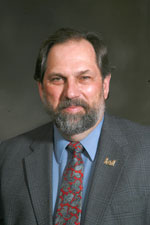 |
William D. Franz Upper Mississippi River Team Manager, Watersheds and Wetlands Branch, Water Division, Region 5, Chicago, IL William Franz is a career EPA employee, beginning his employment at EPA in June 1972 after graduating from the University of Illinois Chicago with a BS degree in Environmental Engineering. He also has an MS degree in Public Health from the University of Illinois’ School of Public Health. Mr. Franz worked in the NEPA Review Program for the first 25 years of his career and was the chief of the program in Region 5 for 10 of those years. In the past 12 years, he has served as the region’s lead on water quality and environmental restoration issues related to the Upper Mississippi River. In his current capacity, he is involved with the states on matters related to Section 303(d) and 305(b), working with the states as the EPA representative to the Upper Mississippi River Basin Association (UMRBA) and the Water Quality Task Force of the UMRBA, as well as working with the Corps of Engineers on their environmental restoration program on the Upper Mississippi River, coordinating regional efforts related to hypoxia in the Gulf of Mexico, and the biomonitoring/early warning network on the Upper Mississippi River |
 |
Gerald E. Galloway University of Maryland, College Park, MD Gerry Galloway is a Glenn L. Martin Institute Professor of Engineering and affiliate professor of public policy at the University of Maryland. He recently chaired an Interagency Levee Policy Review Committee for FEMA and a study of deep flooding potential in the Central Valley for California. In 1994, he led a White House study of the 1993 Mississippi River flood. Dr. Galloway served in the military for 38 years, retiring as a Brigadier General. He is a professional engineer, a member of the National Academy of Engineering, and a Fellow of the National Academy of Public Administration. |
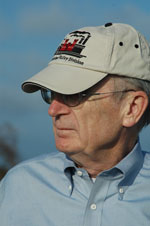 |
Michael D. Hubbs Director of Ecological Sciences Division, Natural Resources Conservation Service, U.S. Department of Agriculture, Washington, DC Mr. Hubbs has held numerous positions with the National Resources Conservation Service. Before becoming the director of the Ecological Sciences Division, he served as State Conservationist in Kentucky. He has served as National Agronomist and National Nutrient Management Specialist in Washington DC. He began his career in 1977 as a soil conservationist in Tennessee. He served as a soil conservationist both in Cleveland and Memphis, Tennessee from 1977 to 1979. He served as District Conservationist in four locations in Tennessee, Maynardville, Dandridge, Morristown, and Memphis from 1979 to 1991. From 1991 to 1994, he served as Area Resource Conservationist in Columbia, Tennessee. He served as State Agronomist from 1994 to 1996, and as Agronomist on the Soil Quality Institute from 1996 to 2004. He holds a BS degree in Plant and Soil Sciences from the University of Tennessee and a Master of Agriculture degree focusing on Agronomy and Soil Quality from Auburn University. |
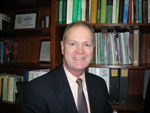 |
T. Jack Huggins The Nature Conservancy, Peoria, IL Jack Huggins has focused on land management practices in agricultural landscapes and their impact on freshwater ecosystems with the Upper Mississippi River Program of The Nature Conservancy. The Nature Conservancy believes that there are opportunities to improve watershed performance, both with first-generation ethanol crop production (corn) and with second-generation crop production (perennial biomass). Jack is past chairman of the Renewable Fuels Association (national ethanol producers' trade association), and he is on the board of directors of Mascoma Corporation, a leading second-generation research and production company. |
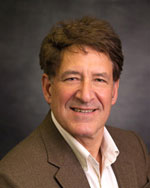 |
Steven E. Kraft Southern Illinois University, Carbondale, IL Dr. Kraft is chair of the Department of Agribusiness Economics and co-director of the Environmental Resources and Policy PhD program at Southern Illinois University, Carbondale. His specialty areas are soil and water conservation policy, watershed planning, and ecosystem services. While at SIUC, he has obtained over $3.5 million in grants from sources including the National Science Foundation, U.S. Department of Agriculture, Joyce Foundation, The Nature Conservancy, and Illinois Council on Food and Agricultural Research. Recent publications include The Law and Policy of Ecosystem Services with J.B. Ruhl and Chris Lant. He teaches farm management, natural and environmental economics and policy, and social perspectives on environmental issues. |
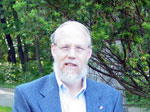 |
Ken Lubinski U.S. Geological Survey, La Crosse, WI Dr. Lubinski is a river ecologist at the Upper Midwest Environmental Sciences Center. He led the scientific design of the Long-Term Resource Monitoring Program for the Upper Mississippi River System, authored the first conceptual model of the Upper Mississippi River, was the senior editor of Ecological Status and Trends of the Upper Mississippi River System, 1998, and organized a 2006 workshop and science strategy on Mississippi River ecosystem services. He is especially interested in applying scientific knowledge to help society and its representative institutions find a sustainable balance among all of the river’s values and uses. |
 |
Nicholas Pinter Southern Illinois University, Carbondale IL Prof. Pinter studies earth-surface processes and hydrology applied to a range of problems. The main thrust of this research is on river dynamics and flooding, in particular quantifying increases in flooding due to human modifications of rivers. Work often focuses on “empirical hydrology,” meaning using geological and empirical hydrologic data to test assumptions in hydraulic models and hydrologic approaches. Pinter works primarily on large alluvial rivers, including the Mississippi, Missouri, Rhine, Danube, and others. His work has been funded by the National Science Foundation, MacArthur Foundation, von Humboldt Foundation, and most recently, new funding under a Marie Curie Fellowship of the European Commission. |
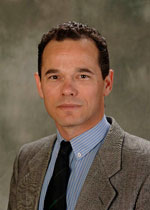 |
Stephen Polasky University of Minnesota, St. Paul, MN Dr. Polasky holds the Fesler-Lampert Chair in Ecological/Environmental Economics at the University of Minnesota, where he has a joint appointment with the Department of Applied Economics and the Department of Ecology, Evolution and Behavior. He served as the senior staff economist for environment and resources for the President’s Council of Economic Advisers in 1998–’99 and has served on committees on the value of ecosystem services for EPA’s Science Advisory Board and the National Research Council. He is currently working on a book on ecosystem services in conjunction with colleagues at the Natural Capital Project. |
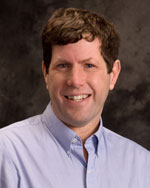 |
Matt Rota Gulf Restoration Network, New Orleans, LA Mr. Rota is the Water Resources program director for the Gulf Restoration Network (GRN). Through his work with GRN, he advocates for healthy waters throughout the Gulf of Mexico region. He also works with Mississippi River Basin organizations to promote policies that will reduce the Dead Zone-causing pollution flowing to the Gulf of Mexico. Mr. Rota currently focuses on water pollution issues in Louisiana, the Mississippi River, and the Gulf of Mexico, working to ensure that adequate policies regarding wetlands, water quality, and nitrogen and phosphorus pollution are adopted and implemented in order to protect and restore waters of the Gulf of Mexico region. |
 |
Silvia Secchi Southern Illinois University Carbondale, IL Dr. Secchi is an assistant professor in energy, economics and policy in the Department of Agribusiness Economics at Southern Illinois University, Carbondale, Illinois. She has published on a variety of issues related to the interface between agricultural activities, agricultural and energy policy, and the environment, particularly water quality and greenhouse gas emissions. She is involved in several interdisciplinary projects. Currently funded work includes collaborative efforts on the economics of ethanol production in the Upper Mississippi River Basin and economic and environmental impacts of land use changes at various scales across the Midwest. |
 |
David M. Soballe Engineer Research and Development Center, Vicksburg, MS David M. Soballe is currently a research biologist with the U.S. Army Corps of Engineers. He has conducted over 25 years of research in limnology, water quality, and river and reservoir ecology and has held research positions with state and federal agencies and academic institutions. Dr. Soballe has extensive experience working in interagency groups on water quality monitoring, data acquisition, and environmental management and restoration. He possesses expertise in the requirements and difficulties of monitoring a large floodplain-river system and in using monitoring data to guide management decisions on restoration. |
 |




